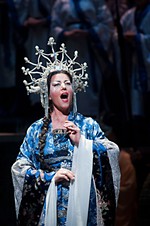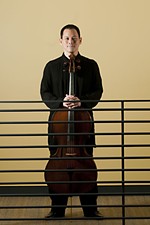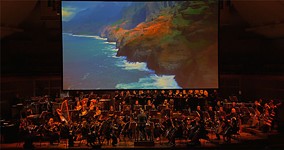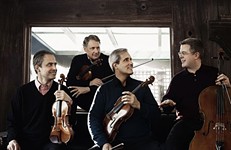Aida: Outmatched by the Set
Local Arts Reviews
Reviewed by Robi Polgar, Fri., March 17, 2000
Aida: Outmatched by the Set
Bass Concert Hall,
March 3
Running time: 3 hrs, 30 min
What can a million dollars buy you? Well, if you're Austin Lyric Opera and a dozen other North American opera companies, it can get you a share of a heavily touted touring production of Aida, Verdi's powerful take on a love triangle that leads, inevitably, to death and despair amidst the swirling struggles of a war between rival nations Egypt and Ethiopia. A million dollars cannot buy you aesthetic pleasure, however, and while ALO must be ecstatic that demand for tickets for this season finale required the addition of an unprecedented fifth performance, this three-years-in-the-making opera turned out rather drab, in spite of the awesome set design and Priscilla Baskerville's gorgeously voiced title character.
The brainchild of English director Colin Graham and set designer Gerard Howland, this Aida had enormous visual impact when the set was unpeopled. But the effect created by the basic tenet of operatic performance that the singers stand in downstage positions facing the house, belting out powerful song, tended to negate that of the stunning set. The gulf between the simple musicality of opera and the desire to create a conceptually striking setting within which to sing was never clearer.
The first strains of the overture grew into a swell of Verdi's lush and potent music, and provided a staggering sense of the production's monumental possibilities: Lights slowly revealed slashing, angled walls to one side that conveyed images of pyramids or knife blades rising out of the stage floor; off-white steps added to the pyramid effect. Dominating all this was an immense sculpted eagle of gold, poised as if in mid-capture of some prey, its giant wings spanning the central area of the stage. To top it all off, this image of power incarnate revolved, allowing multiple views of the warrior bird and offering an intriguing sense that the forces of might must overcome the forces of right, with tragic consequences. The several-ton sculpture even had a stair molded into one wing, which allowed breathtaking tableaux with characters aloft on the tail of the bird, overlooking a panorama of Egyptian citizenry.
But adding frail humans to this grand setting undercut its grandeur: Opera singers, perhaps unaccustomed to precarious heights, looked exceptionally nervous gingerly picking their way up and down the steps of bird or stage, which rather detracted from the warrior nation status of this stage Egypt. The humans were outmatched by the set.
Choreographed dances brought out another aspect of the incongruity between concept and performance. While some of the dances fit well into the conceptual Egypt of pale fabric, giant golden eagle, and projected hieroglyphs, a clunky re-enactment of the battle between nations, with its overt rape sequence, offered only a reduced, literal viewpoint that worked against the enormity of the concept. Even more contrived was the mostly off-white-clad, shifty chorus: A body of poorly wigged Egyptians mixed with horrifyingly scraggly Ethiopians (most portrayed by white actors in dark body paint to make them look dark-skinned -- so much for Black History Month), who gave the impression of a field of wheat, ever bending and rustling in the breeze, adding a layer of unintended levity to Verdi's grave tragedy.
So, on to the three main characters in this doomed affair: Radames, the leader of Egypt's army; Amneris, daughter of the King of Egypt, so in love with the unrequiting Radames that she borders on insane; and Aida, the slave girl torn between her Egyptian lover and her royal Ethiopian heritage. Carlos Moreno as Radames and Marianne Cornetti as Amneris provided strong singing within stoic performances, and the returning Jonathon Prescott (who sang the Commendatore in this season's Don Giovanni) made the most of the stiff and sinister High Priest, Ramfis. Robert McFarland was a forceful Amonasro, King of Ethiopia, with a warm baritone, and as the King of Egypt, Kevin Maynor matched McFarland's baritone with an elegant and strong bass (although Maynor looked as uncomfortable moving about the set as the rest of the cast).
But this opera is called Aida, and in the tragic lead role of princess-turned-slave girl, Priscilla Baskerville was superb. Equally gifted singing and acting, and quite comfortable moving about the stepped set, the soprano provided a vital link to the passion of Verdi's music and to the passion of the lovers' story. Her elegance and charm elicited a much-needed sense of human warmth from this dour production.










